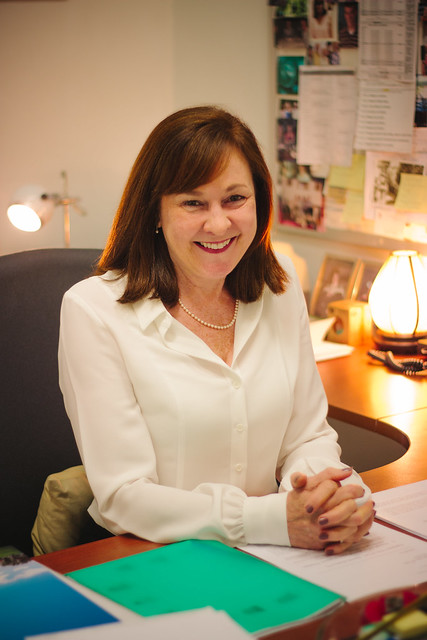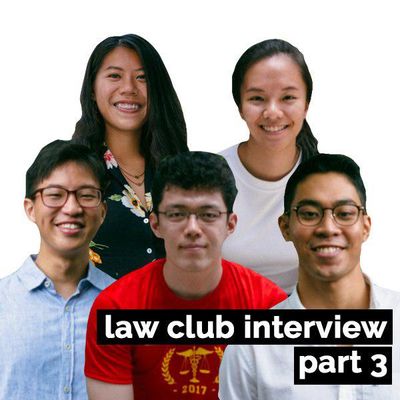Professor Fordham’s office, upon entering, is overwhelmingly homey. She has left her door open for us. The orange-tinted lamps are a stark contrast to the cold, fluorescent glow of the Federal Building lights outside. Her desk is decorated with ornaments and glass bowls full of stationery. She has the Tort Law study guide open in front of her, next to the tutorial list, and a teal folder. She invites us to sit, gesturing to two swivel chairs accentuated by small batik pillows.
As with many years, she was the professor who introduced us to the tort of negligence, and the duty of care. This year, she did the same for the Year One students, but towards the end of her fourth lecture she announced her impending retirement. A few frantic messages and emails later, we secured an interview with Professor Fordham.
We were wondering — What’s next? What are you going to do once you retire?
“Well, I travel a lot already, but I’m going to travel more now.” And I’m not retiring completely. I’m going to work for my husband’s consultancy, but that job will offer me the flexibility to travel throughout the year.
She takes some time to explain that she comes from a far-flung family — her brother lives in the US, and her two daughters, one a lawyer, and the other an environmental policy analyst, live in the UK and New Zealand respectively. Both her parents lived in Singapore, and although her mother passed away last year, her father still lives here.
Curious about the international background of her family, we ask: “Don’t you miss them? Isn’t it hard to meet up?”
Behind her are two photographs of her daughters, and next to them is a smaller, older picture of the whole family. “I miss my daughters terribly,” she tells us. “The older one went to boarding school at 16 — she chose to do so — and the other one chose to stay here until she was 18. They both had their tertiary education in England, so it was very hard when the second one left, and I no longer had either of them at home. But it’s now ten years since the second one went to university, so even though I still miss them, I’m now quite used to their absence!”
She mentions that the daughter who lives in New Zealand is about to get married to a New Zealander (on which we congratulate her), and that she has just returned from a five-day trip to visit them. “I came back last night from Auckland. These days, it’s really easy to travel … so I pop over to places quite often.”
“I was brought up with my father travelling a lot for business, and in this sort of international family, you just have to accept being apart from your loved-ones for much of the time. That’s just life when you’re all based in different countries.”

It’s no wonder her bulletin board seems less for notices and more for pictures of her family and friends, all of which have been stapled, pinned, and arranged neatly into a montage of smiling faces.
“I’m 60 now, so I decided to make a change and spend more time with my friends, family, and loved ones — travelling, doing the things I want to do. Because you never know how much time you have left, really.”
In the pause between questions, we remark on the comfortable feel of her office. Amused, she says, “Sometimes, people come in and say — “It doesn’t look like you do any work in here! It looks like you just sit here all day!” I do get work done in here, but I like to be in an environment where I feel at home.”
Gesturing to her bulletin board, she continues. “So, I’ve always had lots of photos up.”
Professor Fordham previously taught two full courses: Tort Law, and Common Law Reasoning (a Master’s course introducing Civil Law students to the Common Law). She’s since stepped down from teaching the latter, so now she’s only teaching Torts. “I’ve finished my lectures, and my tutorials are only once every other week. It’s a nice way, really, to get used to the prospect of retiring from the Faculty.”
“What is it like teaching Torts now?”
“Same as always — I love teaching torts. It’s my favourite subject.”
We tell her that her lectures are full of quirks, life, and humour, and that when she teaches, we can tell that she’s really passionate about the subject. “I just like it … even though I actually drifted into Torts, it suits me. I can’t give you a specific reason really, other than that it’s about real people in real situations, and I like that!”
Professor Fordham goes on to explain how she started teaching Tort Law in the first place.
When she was in practice (with the firm that’s now called Clifford Chance), she was in the Commercial department. When she moved to Singapore, she was hesitant about practising, as offshore law firms in those days were very small — “two-man firms” as she calls them. “My husband was with one such firm, and no other firm was going to want to employ the spouse of a competitor — it would have been too incestuous. So I got a job with the Law Faculty, and I assumed they would give me commercial or corporate subjects to teach — but what they needed were people to teach Agency Law and Tort Law. So that’s what I ended up teaching.”
At this point in the interview, Professor Fordham’s phone rings. She excuses herself and takes the call, and we catch her saying “Hi Daddy!” before promising to call her father back later. When she’s done with the call, we resume the interview, significantly more amused than before.

There is a small potted pothos with its vines hanging off her desk, and next to the door sits a much larger, also potted, caladium, both of which she mentions are fake (I touch the plastic leaves to confirm this) — she’s tried growing real plants, she says, but it never works out because her office is just too shady, thanks to the trees outside.
“What is it like teaching here – the environment, the staff?”
“Oh — well — I’ve never taught anywhere else, so I can’t really compare. But I’ve really enjoyed it!”
She mentions that she lives fairly close to our campus — about a ten minute drive or a 35 minute walk away, and it’s convenient for her. “But I, um, never walk to work. In another climate, I would walk. But, you know, in this climate … you just get so sweaty and hot. I love walking, but that’s only when I’m in the right clothes and don’t have to have my hair and makeup looking alright at the end of it.”
“Do you prefer teaching, or practice?”
“I didn’t particularly enjoy practice, if I’m honest. I much prefer teaching.”
We follow up, asking if it’s tiring, having to do the same thing every year, with every incoming batch.
“Well, I only give each lecture once a year, which isn’t really that often. And even if I’ve taught things before, I’ve got to update them, make changes — I always find lecturing very stimulating. And if you get to the stage where it isn’t stimulating, there’s something wrong, because you’re talking to a room of 250 people who’ve never heard this before and so you’ve got to do a good job. It keeps you on your toes.”
Professor Fordham also teaches six tutorial groups in the first semester — every fortnight, all on the same topic. “I really work hard not to get stale, or bored, or feel like I’m getting repetitive. It’s important that I’m just as good with the sixth group as I am with the first. I remind myself that it’s important for them, and that it’s not their fault that I’m teaching the same topic six times.”
On the point of repetition, she mentions that it’s not actually as tedious as one might think. “People ask different questions, and there are different dynamics. And there’s usually something specific that’s raised in each of the groups that isn’t raised in any of the others.”
“So how have the students changed over the years?”
“Every year is slightly different, and every group is slightly different. Fundamentally we’re very lucky here because we’ve got very high calibre students.” If anything has improved, she says, it’s the general use of English — it’s always been high, she says, but it’s even higher now.
“Oh, and everything is much more service-oriented now. In some ways, students expect more outside class contact hours. They expect you to sort of be there for them. They email you after class, and expect you to email straight back — I’ve even had students who, if I didn’t answer overnight, would send me another one reminding me!”
“When I started, we didn’t have desk-top computers or email. So when students wanted to see you, they’d have to ring you on your office phone and make an appointment — and they were way less likely to do that.”
She elaborates that while she does respond fairly quickly to emails (because if she doesn’t, she tends to forget them), she tries to keep her answers short. “I say to students, if you really want to consult me, then come to see me. From my point of view, it’s much better to sit and talk to them than to type out a long answer.”
Talking about students, we ask the question that we have to ask every Professor: “Who was your most memorable student?”
Professor Fordham has two.
“There was one young man who was a very good student. A year or so after I stopped teaching him, I saw him one day. He was clearly unhappy about something, and I asked him if he wanted to talk, but he said no. Later, however, he came to see me and told me that he’d given up his place on the Faculty’s Exchange Programme for family reasons, but that he’d immediately regretted it. And normally once you’d given up your place, that was that.”
“But I felt really bad for him.”
“Since he told me the reasons he’d done it — and he was so upset — I contacted the people within the Faculty who were in charge of the programme, and interceded on his behalf. He was re-instated, and he really benefitted from his year overseas. He was a student for whom I felt I’d actually been able to do something concrete, and it made me feel good!”
“And … I’ve had students who are very funny, and with whom I’ve had a sort of banter.”
“I had a student one year who grew a ponytail, which he tied quite high on his head. I made some joke about the ponytail during class, as he was answering a question, and he just glared at me, packed everything up and left the room — and I thought, oh my god, I’ve crossed the line. I should never have joked about his ponytail! Of course, he himself was joking when he left the room pretending to be upset, and he immediately walked back in with a huge smile on his face. But it taught me a lesson – however much people like to joke, and however much fun you want lessons to be, there is a divide you have to keep,” Humour, Professor Fordham feels, makes the classes go by more quickly, and makes them more enjoyable for everyone – but it’s important to check yourself and avoid causing offence.

“With your six classes and constant emails – is it very stressful?”
“Noooo, no. In the beginning it was – I remember I was teaching three courses in my first year, and I’d never taught before. And I was, what, 27?” Back then, the courses she taught had classes every week, and they were all subjects with which she was unfamiliar. “That was tough. But of course once you’ve taught a subject once it becomes easier, because you’ve got all the notes, all the materials. And once you’ve done it as many times as I have now, there’s not much which I’d say stresses me.”
She concedes that she does get tired after a long day of tutorials, and that there’s a healthy level of adrenaline when lecturing, but it’s not stress. “One of the things I like about the job is that it’s demanding but not usually stressful — though having said that, when I was at the beginning of my career, it was probably less difficult for people starting in the academic world than it is now. A young academic now has a lot of pressure to publish, you know, and it’s probably a lot more stressful than it used to be.”
Knowing a few friends who want to enter the academic world, we ask: “Would you have any advice for aspiring academics?”
Life as an academic, she notes, is intellectually stimulating. “If you’re one of the top students, and if you have an interest in academic issues rather than purely practice-oriented ones, then it’s a good career.” There are fewer formal working hours compared to practice, and there’s more freedom to decide for yourself when to prepare and write. “It’s a really good career for the right person, if you have an academic bent and an inquisitive mind.”
Conversely, though, there’s a temptation to feel that the work never really ends. “If you’re in practice, you work long hours, then you go home, and you probably think, “Okay, that’s it until tomorrow.” Whereas if you’re a young person trying to forge a career as an academic, and you’ve got to publish, as well as prepare for classes, you can’t ever really draw a line at the end of any given day and feel that you’ve actually finished.”
With respect to teaching, she notes that professors aren’t really trained to teach. “I think we’re lucky that in the Law Faculty just about everyone is a pretty good teacher, and some people are extremely good – generally, lawyers are fairly articulate, and that’s part of the battle. But it’s still not everything, and until you actually try teaching you can’t know whether or not you’ll have a natural talent for it.”
When we follow up, asking her about her first experience teaching, she laughs sheepishly. “My first class, I just had to go in and do it. At the beginning it was quite scary; I’d never spoken to a large group of people before. I don’t think I’d ever made a speech before. It’s one of the slight oddities of academic life that we’re called on to do something which may well be quite contrary to our slightly introspective natures. It’s fortunate that a surprisingly large percentage of academics turn out to have a facility for teaching.”
“Apart from this first time giving a lecture, was there any other difficulty you’ve faced? Whether in the academic world, or in the corporate world, since you have a background in both.”
“I found practice — and this was many years ago, since I left practice in my mid 20s — quite stressful, and the kind of big firm I was in, people didn’t really like you to ask for help. So you’d have teach yourself an awful lot. And even though I had to teach myself a lot here, too, I found it to be a much more supportive environment.”
“Based on that experience, do you have any advice for students?”
Professor Fordham pauses to think, and then continues. “If you’re planning to go into practice, it’s important to try to work for a firm which will suit your personality. When I started out, I think I probably joined the wrong kind of firm for me. My friends and I didn’t know enough about the different kinds of firms to make an educated decision about where to go when we graduated – so when we got offered jobs by good firms we just took them. Nowadays, my advice would be that — assuming you have a choice — you should consider the type of law, and the kind of firm, which will be right for you.” She tells us that her younger daughter works in a smaller firm which acts for private clients, and that while her work is sometimes stressful, it offers a more manageable work-life balance than she herself enjoyed when she was in practice.
Two long, white, fuzzy carpets lead to a lounge chair next to a shelf stuffed full of law reports, catalogued by year embossed in gold on their covers. Before we leave, we ask to take a photo of her – at her desk, in her comfortable, homey office.









